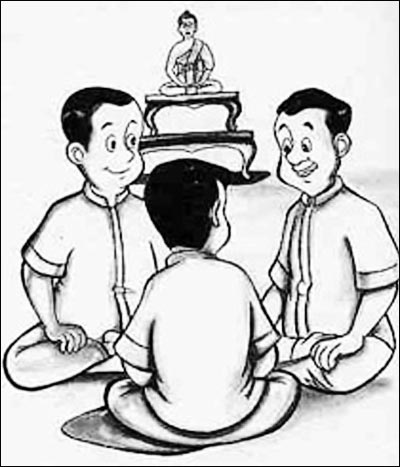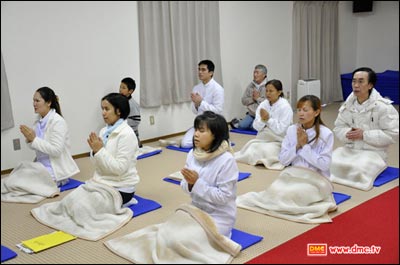Regular Dhamma Discussions
Dhamma Discussions are conversations consisting
of question and answer sessions, between two or more people.
“Wisdom is the gem of the people”
This is a proverb the Lord Buddha taught, reflecting the precious value of wisdom. The foundation of human life is based on a great number of problems. We must rely on wisdom as a solution to these problems. Wisdom can be achieved in two ways:
By listening to Dhamma from a knowledgeable person
By thinking over, considering or reflecting back upon some knowledge
Participating in regular Dhamma discussions are ways to gain wisdom more quickly. This is also a natural way to discipline oneself to listen to speak and to reflect on the topic(s) discussed.
What are Dhamma Discussions?
Dhamma Discussions are conversations consisting of question and answer sessions, between two or more people. They are intended to increase or achieve wisdom with a pre and clear mind.
In Buddhism, the word Dhamma has 2 broad meanings:
1. Dhamma is the natural truth, i.e. all humans have to be born, get old, get hurt, and all will eventually die.
2. Dhamma is the good and the right way, i.e. generosity (giving), observing precepts, and having respect for others are all good ways of behaviour. One who follows these is considered as a Dhamma practitioner.
Proper Dhamma discussions include talking about the good things to do, as well as discussing wrong doings, so as not to practice the wrong doings. Dhamma discussions also include talking about the natural truths and accepting the fact that the truth is the truth.
The person speaking about Dhamma must be able to communicate effectively with the group.
The difficulty of having a Dhamma Discussion
Having a discussion on Dhamma should be regarded as normal similar to having a simole conversation with friends or family. Those who disregard and do not participate in Dhamma discussions often cannot hold or sustain a conversation on the topic for long and eventually break apart from the conversation.
1. The person speaking about Dhamma must be able to communicate effectively with the group.
The speaker needs to have a firm understanding of the topic to be discussed as well as use respectful and accurate language. In this way the listener will not become offended nor misunderstand what is being said.
- The topic must to be true.
- Speak using polite vocabulary.
- The topic must be useful and/or productive.
- Speak with a good intention.
- Speak at the right time and place, on the right occasion, and in the right situation.
When having a conversation on Dhamma one must focus on the truth as a basis for all learning and wisdom as well as refrain from showing bias or being opinionated. For example, it is unproductive to praise each other. You can do it but it doesn’t make people to improve them selves.
“You are good and I am good.”
It also makes no sense to find fault and pick on each another.
“You have a bad attitude, and you did this and that wrong.”
This will lead to an argument and both and both sides will end up with ill feelings and carrying grudges. It is important to be aware of the atmosphere and dynamics within the group and maintain a moderate balance during Dhamma discussions
2. The person listening to Dhamma seems to have the easiest part.
Just listen and that is all; right? In reality listening to Dhamma correctly is to listen and to analyze at the same time. One obtains the most benefit grom listening to Dhamma by absorbing the key points. This is why it is said that listening to Dhamma is more difficult than speaking it.
- It is also difficult to keep your mind on the subject, since listening to Dhamma is not as entertaining as watching a movie or listening to your favorite music.
- It is difficult to accept some of the material of Dhamma. The teachings might conflict with the daily lifestyles, ego, or the habits that people are accustomed to. Thus, they do not want to change or find changing too difficult.
Those who are able to listen to Dhamma without difficulty must put more effort into listening and absorbing the material, so that the teachings become so familiar to them that they eventually form the basis for how they live in the world. In addition one should also practice to be a respectful person. This includes not looking down on others, not being superior to others, not depending on others, having a limit, and being a grateful person, All of these will help in under standing Dhamma.
3. During a Dhamma discussion one must be able to engage actively in the conversation.
One needs to follow the rules of polite conversation that include both respectful listening and speaking. You talk, I listen; I talk and you listen; type of scenario. Sometimes there will be moments when you do not want to hear what is being said, but since that person is talking, then you must lidsten. At other times you may want to say something, but there is no chance to do so, then you must hold on to your comment until an appropriate moment, to interject, presents your opinion. During a discussion on Dhamma, there are times when one may be offended, criticized, corrected or perhaps praised. If one cannot keep a steady and peaceful mind during a discussion, then anger, ill feelings, grudges or worse may arise.
Those who are able to hold a conversion on Dhamma must be able to tolerate any negative comments or remarks from the other person. Naturally, if both persons hold the same views on Dhamma and are able to control their temper then it makes the conversation so much easier.
There once was a saying that speaking Dhamma is like throwing a punch out into the open air. You can do it as many times as you like and you will not get hurt. Listening to Dhamma is like throwing a punch at a sand bag; you will get hurt once in a while. But having a conversation on Dhamma is like being in a boxing ring. Giving and taking punches.
You have more opportunities to gain additional knowledge of Dhamma.
Things to practice before holding a conversation on Dhamma
1. Keep up the precepts for at least 3 days in advanced. For example, one should not be intoxicated and have a conversation on Dhamma at the same time.
2. Practice meditation consistently, preferably right before the conversation. This will allow one to have a fresh and clean mind, free from unwanted thoughts.
3. Wear the appropriate attire; one shouldn’t be half naked while discussing Dhamma.
4. Be well mannered, and in a calm state.
5. Use polits vocabulary, including not speaking too loudly or acting superior to others. Also, if you don’t know something, say, “I don’t know.” Give praise when necessary and point out mistakes when needed.
6. Do not speak against or deny the teachings of the Lord Buddha. It is okay to express a personal opinion.
7. Do not use language that may upset or offend others.
8. Do not express anger when one is spoken against. Instead take it in for consideration. It could be a misunderstanding, or a matter of interpretation such as; some things are correct in one situation but incorrect in another.
9. Do not have the intention to take advantage of the situation to draw attention to yourself, to be popular, to be a big shot, to be a “Mr. Know It All”. Or to try to prove someone else wrong.
10. Have a mindset to communicate Dhamma so that people can gain wisdom and exchange knowledge.
11. Do not speak outside the present case or issue that is up for discussion. Doing so may lead to the wrong path. For example, if you are discussing generosity, then bringing up other people and saying are discussing generosity, then bringing up other people and saying that this person or that person does not contribute to charity is irrelevant to the discussion.
12. Do not go on and on and on… so that it becomes boring. Even though the discussion maybe interesting and fun, it still should have limits depending on the situation. For example: When you are eating your favorite meal, even though it is delicious and you don’t want to stop eating, when you are full it is time to stop.
Strategy for Dhamma Discussions
Write a summary of the key points for Dhamma Discussions:
1. Discussing in Dhamma; donot get off topic and talk about non-Dhamma topics. For example, if you are talking about not doing bad things, end the topic on not doing bad things. Do not go on and gossip about this or that person who is doing bad things.
2. Discussing with Dhamma; do not be biased when discussing Dhamma. Do not show signs of superiority if you are more knowledgeable than the other person. Praise others sincerely when appropriated and point out errors when necessary. The intention is not to embarrass or put the other person down.
3. Discussing for Dhamma; the purpose of the discussion is to expand your and the other person’s knowledge, not to be a show off.
It is part of keeping the Buddhist tradition.
How to choose a discussion partner
There are two basic criteria for choosing a discussion partner
1. Your partner must be a person who has the desire to learn and expand his/her knowledge of Dhamma. Also he/she must be a person with a calm demeanor or manner.
2. The topic being discussed must be suitable in some way for that person. For example: meditation with a person who has some experi3ence in practicing meditation.
Discussing Dhamma within within the family
In the past, in a traditional Thai family, discussing dhamma was a regular occurrence. The parents would go out to work in the fields while the grandparents stayed at home with the children. The grandparents would call the children over to tell a story about Dhamma and then when the parents come home from work the whole family would have dinner and they would talk about Dhamma. This regular and repeated practice served to educate the children within the family. In this way the children would become more knowledgeable and be able to figure out what is good and what is bad for them. Sometimes the wring doings of the children were corrected immediately, if they were caught in the act and sometimes correction did not occur till the wrong doing seemed to become a habit.
Today, the traditional Thai family practices have changed and it is no longer so common for a family to get together and discuss Dhamma. It is more likely that everyone goes off and watches TV or a movie or dose his or her own things after dinner.
Parents if you want your children to be good people, do not neglect the importance of discussing Dhamma with them on a regular basis.
To those parents; who believe that keeping their children happy by giving them money and material things while neglecting to teach them Dhamma; be ware that the chances that your children will grow up to be bad people are much more likely.
The Benefits of Discussing Dhamma
1. It fills your mind with merit.
2. Your intention is positive.
3. You become more intelligent and wise.
4. You have more opportunities to gain additional knowledge of Dhamma.
5. Eventually any misunderstanding of a Dhamma topic will become clearer.
6. It will clear up misconceptions or suspicions.
7. Gain more correct thinking and ideas.
8. It is a way to practice keeping a pure mind.
9. It is part of keeping the Buddhist tradition.
10. You are following in the footsteps of a philosopher.
Meditation - Related Articles
" />
" />









